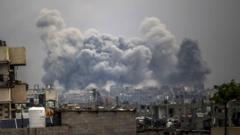As Israel prepares for a potential ground invasion, its military actions might serve as leverage in hostage negotiations while testing Hamas's resolve.
Israel's Ground Offensive in Gaza: Strategic Bluff or Tactical Maneuver?

Israel's Ground Offensive in Gaza: Strategic Bluff or Tactical Maneuver?
Analysis of Israel's military actions reveals a complex political landscape amid ongoing cease-fire negotiations with Hamas.
In recent weeks, the Israeli military has signaled an impending large-scale ground operation in Gaza, intensifying its airstrikes throughout the region and resulting in significant casualties. Despite the rhetoric, Israel has not yet initiated a substantial ground invasion, leading analysts to consider this a strategy aimed at negotiating a cease-fire with Hamas.
Experts attribute this hesitation to ongoing negotiations under the auspices of the Trump administration, who are pushing both parties toward a truce. Israel's current demands center on the release of hostages held by Hamas, while Hamas appears to be advocating for a more comprehensive and permanent settlement. Observers suggest that the Israeli government hopes the threat of losing territory may compel Hamas to agree to a compromised solution.
Shira Efron from the Israel Policy Forum asserts the importance of contextualizing Israel's military escalation within the framework of negotiations. "What appears to be a ground operation can still be reversed," Efron notes. "Right now, this is more of a negotiating tactic designed to heighten pressure on Hamas."
Moreover, the situation reflects the inherent tensions within Israel's political framework, where military decisions and political agendas intersect. While the Israeli military has indicated readiness for an escalation, the absence of direct military action thus far might suggest a cautious approach to avoid further entrenchment in the conflict without robust strategic gains.
As the situation unfolds, the eyes of the world remain focused on how these military threats will impact the dynamics of negotiation and, ultimately, the humanitarian situation on the ground in Gaza.
Experts attribute this hesitation to ongoing negotiations under the auspices of the Trump administration, who are pushing both parties toward a truce. Israel's current demands center on the release of hostages held by Hamas, while Hamas appears to be advocating for a more comprehensive and permanent settlement. Observers suggest that the Israeli government hopes the threat of losing territory may compel Hamas to agree to a compromised solution.
Shira Efron from the Israel Policy Forum asserts the importance of contextualizing Israel's military escalation within the framework of negotiations. "What appears to be a ground operation can still be reversed," Efron notes. "Right now, this is more of a negotiating tactic designed to heighten pressure on Hamas."
Moreover, the situation reflects the inherent tensions within Israel's political framework, where military decisions and political agendas intersect. While the Israeli military has indicated readiness for an escalation, the absence of direct military action thus far might suggest a cautious approach to avoid further entrenchment in the conflict without robust strategic gains.
As the situation unfolds, the eyes of the world remain focused on how these military threats will impact the dynamics of negotiation and, ultimately, the humanitarian situation on the ground in Gaza.





















